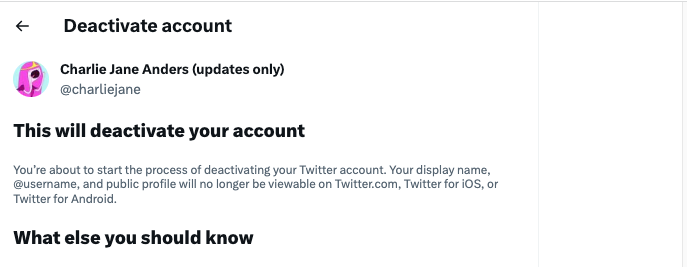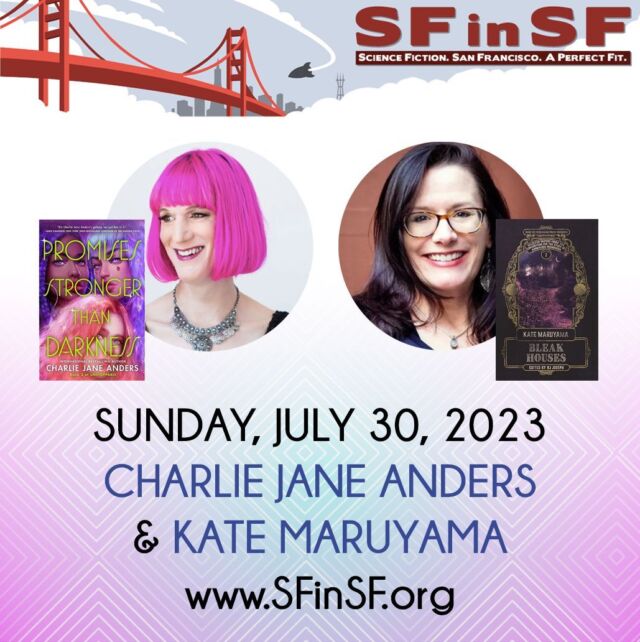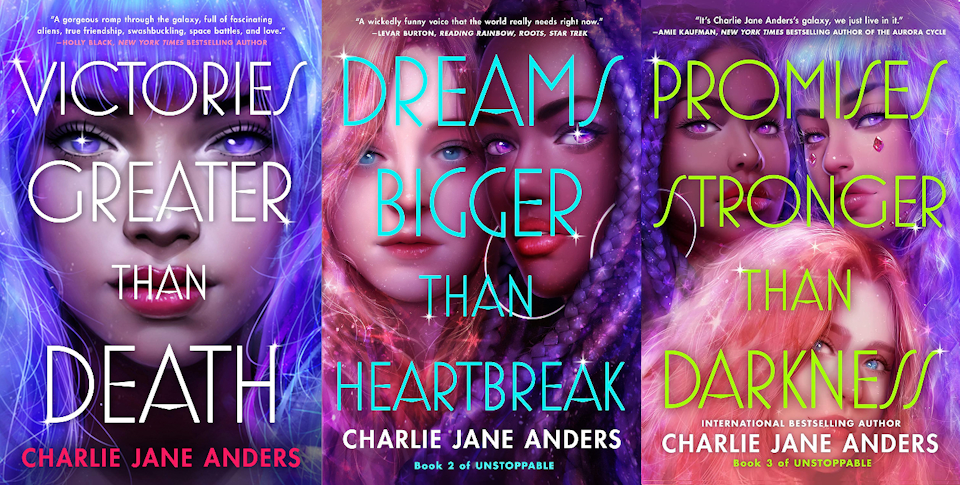If you see me on Twitter, it's not me

Thank you to everyone who just subscribed to my newsletter! I really appreciate it, and I promise that I will be putting out new posts at least once a week from now on. To long-term subscribers, I can only say that I'm sorry about the radio silence of late: I was desperately trying to finish a novel, and was also traveling and attending too many conventions.
I have a dozen nearly completed newsletters in my drafts folder on Buttondown, but since many of my new subscribers found me thanks to my tweet where I announced that I was quitting Twitter, I thought I should start out by talking about why I'm quitting the bird app. And why I'm not simply locking my account and going dormant.
I'll start with that last question first. Many, many people have advised me to delete all of my tweets, lock my account, and simply stop tweeting. Their argument is that someone else could take my username and impersonate me, which feels like a real, serious issue — but if I leave my account inactive for long enough, Twitter will probably take my username away and let someone else take it in any case. So I apologize in advance to anyone who sees a fake Charlie Jane on Twitter and gets confused. It's not me, I swear. (And that's part of why I'm writing this newsletter: so people can point to it if there's any confusion.)
I feel the need to make a clean break from Twitter at this point. After all of the proliferation of hate speech, and the random shutdowns of progressive accounts that challenge the owner's rigid orthodoxy, I was already wanting to make a break for it. But after the latest scandals involving CSAM, I really feel as though I have no choice. And the "clean break" thing feels important — to be honest, I don't entirely trust myself not to log in a month from now when I have something to announce, unless I delete the account entirely.
The other reason why I am actually deleting my account instead of just putting it to sleep is that I feel a powerful need to draw a line. To use a terrible mixed metaphor, the birdsite has been boiling the frog. Many of us have gotten accustomed to things that would have absolutely been deal-breakers if they'd happened all at once. The flagrant promotion of white supremacy, misogyny, and transphobia has gotten to be the defining characteristic of Twitter at this point. I abandoned Substack over way less.
I've had an ambivalent relationship with Twitter for as long as I can remember. For years, it's felt like the online version of toxic IRL spaces I remember from my early twenties, where people would seize on any excuse to denounce or mock or belittle each other, based on the slightest mis-statement. There's bullying everywhere on the Internet, but Twitter's algorithm always seemed to encourage and promote bullying to an absurd degree.
And meanwhile, authors like me were always encouraged to overshare about our personal lives on social media, as part of "building a brand." Which always felt like fake and manipulative advice to me: make potentially millions of people think they know the "real you," in order to sell them stuff, when real intimacy inherently requires a two-way street. My approach to Twitter was always to be as reciprocal as possible: if you followed me and seemed cool, I'd follow you back. I wasn't interested in having a mob of followers that I shared my personal life with, without wanting to know anything about their lives. And of course, the more private, personal stuff you shared on Twitter, the juicier target for harassment you became.
For more of my thoughts on Twitter prior to last fall, check out my essay on cancel culture.
Still, Twitter always seemed useful: for building real friendships, for having interesting conversations sometimes, and yeah, for pimping my shit. When All the Birds in the Sky was coming out, I put a ton of effort into getting #allthebirdsinthesky trending on publication day, asking everyone I knew to share the hashtag. It's absolutely true that Twitter never really sold books most of the time, but I'm pretty sure the visibility of #allthebirdsinthesky helped boost awareness of the book on its first day. I could tell the campaign was working when white-supremacist accounts started tweeting neo-Nazi propaganda accompanied by #allthebirdsinthesky, to try and catch the wave. (Sigh. Twitter.)
I'm gonna repeat what I've said before: I think the basic concept of social media was deeply flawed — and that's before you have algorithms promoting the nastiest content to try and increase "engagement." It was never a good idea to have one place where we shitposted, built niche communities, promoted our projects, and dissected political stuff. Those things are always going to bleed into each other, but at the scale of something like Twitter it becomes unmanageable. Your shit-posting becomes inherently political (more than is usually the case) and your self-promotion gets overly wound up with in-group/out-group dynamics. You can absolutely have a smaller forum, like a Discord server or like Bluesky at its current tiny size, where all kinds of conversations bleed together. But once a site has hundreds of millions of users, trying to host every kind of conversation at once is going to get weird. (And like I said, once you add the algorithms pushing the most toxic content, it gets way worse.)
That said, Twitter performed a unique function that is now effectively lost: people could share stories of abuse and real-time information about police misconduct, with a huge audience. It was a great organizing tool as well. But I think some of the unique value of Old Twitter was partly an indictment of mainstream media's embrace of groupthink, horse-race coverage, pat narratives, ridiculous moral panics, and both-sides-ism. If mainstream journalists had done a better job, Twitter would never have been so necessary — and these same journalists then turned around and used Twitter to generate stories. At one of my newspaper jobs back in the day, I had a horrible abusive boss, who nevertheless said one thing I think about often: "We're a watchdog, not a lap dog." I wish more journalists understood that distinction.
(On trans issues, a lot of what I used to get from Twitter, I'm now getting from reading AssignedMedia and ErinintheMorning, plus a few other places like Xtra and them. I'm finding Twitter really isn't irreplaceable if you subscribe to good content.)
Meanwhile, I'm currently enjoying the heck out of Tumblr, where I mostly look at fan art, memes, and awesome discussions among queer and BIPOC creators. I have a whole tab on my Tumblr that's just a feed of endless The Owl House fan art! Tumblr has a huge userbase, sure, but it never feels that big to me, in part because the conversations feel more silo-ed. I've had a few posts go super-viral on Tumblr, but nobody seems to be able to tell after a while that the posts came from me, and Tumblr's version of quote-tweeting puts the quotes way at the bottom, where they feel more like old-school comments. I know it's possible to have a toxic experience on Tumblr, but it seems way less possible than it was on Twitter.
My biggest worry about finally abandoning Twitter, of course, is about reaching an audience. I had a decent platform on there: vastly more followers than I currently have elsewhere. Over time, I would really like to build up the subscriber base of this newsletter — again, I promise to post way more often! — and I'd love it if more people also subscribed to Our Opinions Are Correct, the podcast I've been doing with Annalee Newitz since 2018. (The OOAC discord is fantastic and very active, and I'm in there all the time! Give us a couple bucks on Patreon and you can join!) I've also been going to way more conventions lately, as I mentioned, because I think in-person contact is important for both community-building and promotion.
But that's about how I hope to build a non-Twitter platform going forward. What about other authors?
Sigh. I don't know. I wish we had a more robust book-o-sphere generally. The lifeblood of book culture is word-of-mouth and celebration of other people's stuff, and that doesn't have to happen in a sewer like Twitter. It can happen in videos, in chat forums, and other online spaces, but also in bookstores. Supporting independent bookstores is a great way to support authors! Also, though, the slow death of Twitter was one major motivation behind my decision to become a professional book reviewer again. Talking about my own books makes me break out in hives after a while, but I love talking about other people's books. I've now reviewed around fifty science fiction and fantasy books, give or take, for the Washington Post, including some wonderful reads that I feel haven't gotten nearly enough attention elsewhere. I would love more people to bookmark the landing page for my reviews — but also, please talk about books! To your friends! To your neighbors! To people on the bus! Talking about books, in my experience, is better than almost any other conversational topic.
So... yeah. I didn't expect to feel sad about saying goodbye to the Hellsite, because, well, Hellsite. But I do feel kind of bummed. About what it's become. About the people I'm going to lose touch with, no matter how hard I try. There really was a lot to love about Twitter. But now? It's time to stick a fork in that bird.
My Stuff
 I'm going to be at SFinSF, the venerable science fiction reading/discussion series, along with the amazing Kate Maruyama. I'm going to be reading from a brand new thing, which I just started writing on Monday. It's about aliens showing up and stealing the Atlantic ocean, which causes one young trans girl to decide fuck it, she might as well come out and transition. I'm really happy with it so far, and excited to road-test it. This is at the American Bookbinders Museum, 355 Clementina St, San Francisco, at 6:30 PM. (Doors at 6, $10 at the door.)
I'm going to be at SFinSF, the venerable science fiction reading/discussion series, along with the amazing Kate Maruyama. I'm going to be reading from a brand new thing, which I just started writing on Monday. It's about aliens showing up and stealing the Atlantic ocean, which causes one young trans girl to decide fuck it, she might as well come out and transition. I'm really happy with it so far, and excited to road-test it. This is at the American Bookbinders Museum, 355 Clementina St, San Francisco, at 6:30 PM. (Doors at 6, $10 at the door.)
The final issue of my Marvel miniseries, New Mutants: Lethal Legion, came out last week! I've been super happy with the response to it. You can pre-order the trade paperback, but your local comics store probably has the whole thing, or you could order it online from a bunch of retailers. (To get the whole story of Escapade, the trans hero I co-created, start with Marvel Voices: Pride (2022) #1, then read New Mutants 31-33 or the recent New Mutants Vol. 4 trade, and then Lethal Legion.)
If you want to watch me talking about Escapade last Sunday at Comic-Con, here's the full Women of Marvel panel, also featuring Sana Amanat, Jessica Malloy, Melissa Flores, Jody Houser and moderator Sarah Brunstad.

And finally, my young adult Unstoppable trilogy is finally complete! The second book, Dreams Bigger Than Heartbreak, recently won the Locus Award for best young adult novel and was shortlisted for the Lodestar Award for best young adult novel (not a Hugo Award, but given out at the Hugos). I'm proud of this epic saga about a teen girl who chases the legacy of the superhero she was cloned from, only to find her own path instead. There is a LOT in these books about the ethics of non-violence and the challenges of learning to communicate across cultures. And they are SO QUEER. Also, Hynden Walch, the voice of Princess Bubblegum and Starfire, reads the audiobook of Victories Greater Than Death and parts of the audiobook of Dreams Bigger Than Heartbreak. Just sayin'. (Also, the wonderfully talented Sena Bryer and Imani Jade Powers bring so much to the sections they read as well.) I'm super proud of these books, and now you can read them — or listen to them — back to back!